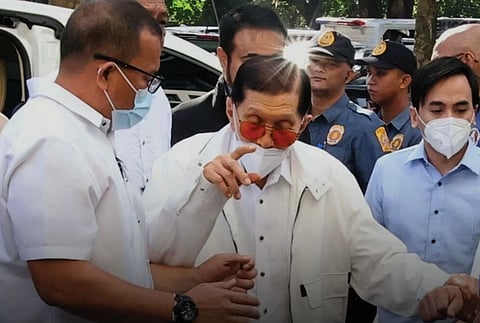Meet 101-year-old Philippine politician: Juan Ponce Enrile, a survivor who has outlasted regimes
Critics decry his role in authoritarianism; admirers praise his survival instincts

Manila: Filipino politician Juan Ponce Enrile (born on February 14, 1924), has seen quite a bit.
Also known as "Manong Johnny," Enrile currently serves as Chief Presidential Legal Counsel.
He is first centenarian to hold such a key post in the Asian country.
Enrile, a Harvard-trained lawyer, politician, and statesman has a distinguished career that spans over seven decades.
Resilience, controversies
He embodies resilience and enduring influence in Philippine politics.
Controversy follows "Manong Johnny", aka JPE.
The most recent cases against him: 15 counts of graft related to the so-called "pork barrel" scam, allegedly involving fake projects funded by Filipino taxpayers but siphoned off by politicians.
On October 24, 2025, Enrile was acquitted after a six-year trial on graft charges.
The Sandiganbayan (anti-graft court) Special 3rd Division cleared Enrile and his former aide Gigi Reyes of 15 counts of graft related to the scam.
However, some of their co-accused acquitted of criminal liability were found "civilly liable" and were ordered to pay ₱338 million (about $5.7 billion) in total.
Enrile and Reyes were not among them.
Family background
Born in Gonzaga, Cagayan, to a modest family — his father a wealthy lawyer and his mother a street vendor — Enrile overcame early hardships, including illegitimacy, to excel academically.
He graduated cum laude from the University of the Philippines College of Law in 1953 and passed the bar exam with a near-perfect score, before going to Harvard for further studies.
His early career as a corporate lawyer honed his sharp intellect and strategic acumen.
Enrile's rise began under President Ferdinand Marcos, whom he served as customs commissioner (1966–1968), justice undersecretary, and defence secretary (1970–1986).
Fake ambush
A loyalist, he helped draft Martial Law proclamations in 1972, justifying Marcos's dictatorship to suppress communism and oligarchy.
Enrile claimed the 1969 ambush on his convoy — later admitted as staged — was a pretext for Martial Law.
As defence minister, JPE oversaw military operations during the regime's repressive years, amassing wealth through cronyism while building a power base in the armed forces.
His defection in 1986 sparked the People Power Revolution.
Barricaded with reformist generals Fidel Ramos and others at Camp Aguinaldo, Enrile's rebellion, amplified by Radio Veritas and civilian support, toppled Marcos.
Post-EDSA, he served as senator (1987–1992, 1995–2001, 2004–2016), presiding over the Senate (2008–2013).
Known for fiscal expertise, he authored laws on agriculture, energy, and anti-corruption.
Controversies
Controversies shadowed him.
There were plunder charges in 2014 over pork barrel scams (he was acquitted later), human rights abuse allegations from Martial Law years, and flip-flopping alliances — he backed Gloria Arroyo, then opposed her; supported Rodrigo Duterte, then assailed him.
Back in 2013, Filipino Senator Alan Peter Cayetano, in a privilege speech, has insinuated that Gigi Reyes, about 30 years younger than Enrile, was Manong Johnny's "girlfriend".
It was Cayetano’s retaliation for Reyes’ accusations of “hypocrisy” against him for supposedly receiving a “cash gift” from the Office of the Senate President.
That spat ended when Reyes "profusely apologised" to Cayetano for her "offensive statements" — followed by her irrevocable resignation from Enrile’s office.
The first public denial came years earlier, in 1998, when the Chicago Tribune reported that Enrile’s wife Cristina left him after she could no longer tolerate his “alleged tryst with a top aide.”
Enrile said in a statement in 1998: “What is totally false and malicious are the reports in the press and the rumour mills that the cause of our marital difficulties is an alleged relationship between me and my Chief of Staff, lawyer Gigi Reyes. There is no relationship, other than an official and professional one.”
When JPE's marked his 100th birthday in 2024, Daily Tribune’s Rina Jimenez-David wrote: "One public persona of Johnny Ponce Enrile is that of a playboy and a ladies' man."
At 101 (as of 2025), Enrile remains active, serving as Chief Presidential Legal Counsel under President Ferdinand Bongbong Marcos Jr (a post JPE held since 2022).
His memoirs, Juan Ponce Enrile: A Memoir (2012), offer a self-justifying narrative.
Critics decry his role in authoritarianism; admirers praise his survival instincts and institutional knowledge.
After Enrile's acquittal on October 24, the presidential palace stated that it "respected" the graft court's decision.
Enrile personifies Philippine politics' blend of opportunism and patriotism, a survivor who outlasted regimes.
Juan Ponce Enrile's Timeline
1924: Born Juan Furagganan in Gonzaga, Cagayan; later adopts Ponce Enrile surname.
1953: Graduates cum laude from UP Law; tops bar exams (98.75% score, adjusted).
1966–1968: Appointed Customs Commissioner by Marcos.
1970–1986: Serves as Secretary of National Defense.
1972: Helps implement Martial Law (Proclamation 1081); stages own ambush as pretext.
1986: Defects from Marcos; leads EDSA Revolution with Ramos, ousting dictator.
1987–1992: Elected Senator (first post-Marcos term).
1995–2001: Returns to Senate.
2004–2016: Serves third Senate stint; Senate President (2008–2013).
2012: Publishes mJuan Ponce Enrile's Timeline
2014: Arrested for plunder in PDAF scam; detained at PNP General Hospital.
2021: Supreme Court acquits him of plunder.
2022–present: Appointed Chief Presidential Legal Counsel by President Ferdinand Marcos Jr.
Sign up for the Daily Briefing
Get the latest news and updates straight to your inbox






